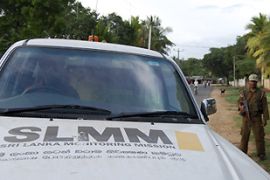Blast marks Sri Lanka truce end
Bus bomb kills at least 24 as government formally abandons truce with Tamil Tigers.

| Related | ||||
|
The Sri Lankan cabinet voted to formally end the ceasefire on Wednesday, two weeks after informing Norwegian monitors that it was withdrawing from the deal agreed six years ago.
Norway had been a key player in brokering the 2002 truce.
Peace mission over
With the truce formally ended, peace monitors are now due to pack up and leave Sri Lanka later on Wednesday, their mission officially over.
The Nordic monitoring group was originally set up to oversee the ceasefire, but increasingly found itself issuing weekly reports on escalating fighting
| Conflict in Sri Lanka |
|
Conflict has claimed more than 70,000 lives
India sent 55,000 troops as peacekeepers in 1987 but withdrew two years later
Norwegian mediators negotiated ceasefire in 2002
Fighting escalated in the last two years with both sides accusing the other of provocations |
In the two weeks since the government first announced that it planned to pull put of the truce more than 300 people have died along the front lines in the north of the country, according to government figures.
Mahinda Rajapaksa, Sri Lanka‘s president, said he has abandoned the ceasefire because it had broken down and was being used by the rebels as cover to build up their strength.
An estimated 5,000 people have died in violence across the country since the ceasefire was signed.
Nonetheless, the government’s move to finally scrap the agreement has been widely criticised by peace mediators and foreign governments. They say it would make finding a resolution to the decades old conflict more difficult.
Bloody conflict
Fighters from the Liberation Tigers of Tamil Eelam (LTTE), also known as the Tamil Tigers, has been fighting for an independent homeland in the north and east of the island since 1980s.
Since then the conflict has claimed more than 70,000 lives.
 |
| An upsurge in violence in the last two years has killed an estimated 5,000 people [Reuters] |
With the prospects growing for a return to all out war, on Tuesday the UN’s top human rights official warned that the government’s move to scrap the truce could have a “devastating effect” on civilians across the island.
Louise Arbour, the UN High Commissioner for Human Rights, said both the government and Tamil Tiger forces were obliged under international law to protect
civilian lives and could be prosecuted if they did not.
She said international law prohibited all sides from committing unlawful killings or torture, arbitrary detention, recruiting or deploying child soldiers, and forcing people out of their homes.
“Violations of these rules by any party could entail individual criminal responsibility under international criminal law, including by those in positions of command,” Arbour said.
Japan, the biggest donor to Sri Lanka, has warned it may cut off aid if the conflict continues to escalate.
But during talks on Monday with a Japanese envoy, Rohitha Bogollagama, Sri Lanka’s foreign minister, warned against “any international action that could jeopardise the government’s initiatives in the peace process”.
Bogollagama said that any international pressure on the government “would only strengthen LTTE intransigence and trigger increased violence”.


